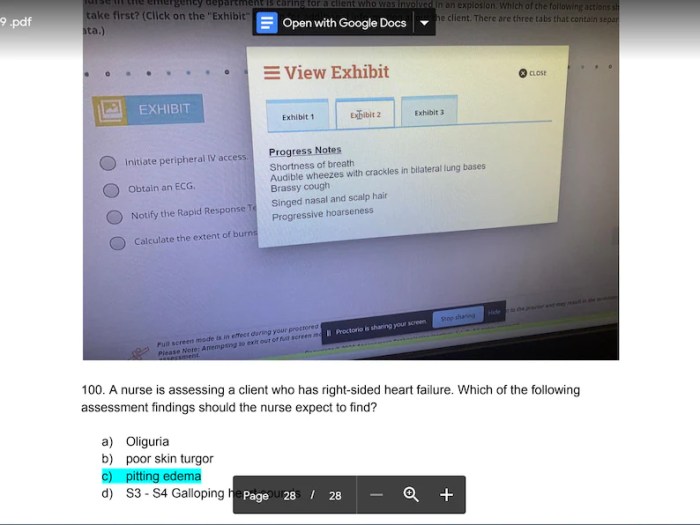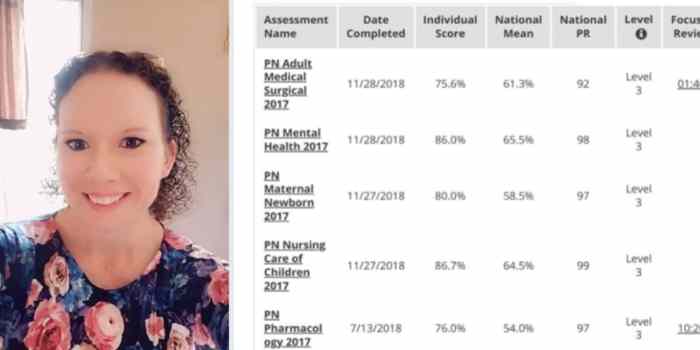Ati proctored exam med surg – Navigating the ATI proctored exam for medical-surgical nursing can be a daunting task, but with the right preparation, you can emerge victorious. This comprehensive guide will provide you with a thorough understanding of the exam’s structure, content, and strategies to help you achieve your desired score.
Delving into the intricacies of the ATI proctored exam, this guide will equip you with the knowledge and skills necessary to conquer this nursing assessment. From understanding the exam’s format to mastering effective study techniques, we’ll cover everything you need to know to succeed.
Introduction

The ATI proctored exams are highly valued assessments in the field of medical-surgical nursing. They are widely recognized for their ability to measure a nurse’s knowledge, skills, and abilities in providing comprehensive patient care. Understanding the format and content of these exams is crucial for success, as they serve as a benchmark for nurses seeking certification or advancement in their careers.
Significance of ATI Proctored Exams
The ATI proctored exams play a significant role in the nursing profession for several reasons:
- Assessment of Competency:These exams provide a comprehensive evaluation of a nurse’s clinical judgment, critical thinking, and problem-solving abilities, ensuring that they possess the necessary knowledge and skills to deliver safe and effective patient care.
- Preparation for Certification:Many nursing certification boards utilize ATI proctored exams as a measure of a nurse’s readiness for certification. Passing these exams demonstrates a nurse’s proficiency in their field and enhances their credibility.
- Career Advancement:ATI proctored exams can serve as a valuable tool for nurses seeking career advancement. Employers often consider these exams when making hiring and promotion decisions, as they provide objective evidence of a nurse’s qualifications.
Understanding the Exam Format and Content
The ATI proctored exams are designed to assess a nurse’s knowledge and skills in a variety of areas related to medical-surgical nursing. The exams typically consist of multiple-choice questions that cover the following topics:
- Medical-Surgical Nursing Concepts
- Pharmacology
- Patient Assessment
- Nursing Interventions
- Client Education
By understanding the format and content of the ATI proctored exams, nurses can effectively prepare for these assessments and demonstrate their competence in the field of medical-surgical nursing.
Exam Structure and Format: Ati Proctored Exam Med Surg

The ATI proctored exam consists of several sections, each with its own time limit and question types.
Section 1: Fundamentals
This section covers basic nursing concepts and principles, including patient assessment, medication administration, and infection control.
- Question Types: Multiple-choice, True/False
- Time Limit: 60 minutes
Section 2: Medical-Surgical Nursing
This section focuses on the care of patients with common medical and surgical conditions, such as cardiovascular, respiratory, and gastrointestinal disorders.
- Question Types: Multiple-choice, Drag-and-drop, Simulation
- Time Limit: 90 minutes
Section 3: Maternal-Newborn Nursing
This section covers the care of pregnant women, newborns, and their families.
- Question Types: Multiple-choice, Fill-in-the-blank
- Time Limit: 60 minutes
Section 4: Mental Health Nursing
This section focuses on the care of patients with mental health disorders, such as anxiety, depression, and schizophrenia.
- Question Types: Multiple-choice, Short answer
- Time Limit: 60 minutes
Content Overview
The ATI Proctored Exam for Med Surg encompasses a comprehensive range of topics that delve into the core principles and practices of medical-surgical nursing.
The exam’s content is structured to assess candidates’ understanding of the following key areas:
Medical-Surgical Conditions
- Cardiovascular disorders
- Respiratory disorders
- Gastrointestinal disorders
- Genitourinary disorders
- Musculoskeletal disorders
- Neurological disorders
li>Endocrine disorders
Nursing Interventions, Ati proctored exam med surg
- Patient assessment and monitoring
- Medication administration
- Wound care
- Pain management
- Infection control
- Patient education and counseling
Nursing Concepts
- Patient-centered care
- Interdisciplinary collaboration
- Evidence-based practice
- Quality improvement
- Ethical decision-making
The exam covers these topics in varying depths, ranging from basic concepts to advanced clinical scenarios. Candidates are expected to demonstrate a thorough understanding of the pathophysiology of medical-surgical conditions, the principles of nursing care, and the application of evidence-based practices.
Preparation Strategies
Effective preparation for the ATI proctored exam in med-surg requires a multifaceted approach that combines efficient study methods and the utilization of various resources. This section will guide you through proven techniques and provide insights into valuable resources to enhance your preparation and maximize your chances of success.
One of the most crucial aspects of preparation is to adopt effective study methods. These methods should align with your learning style and preferences. Consider implementing techniques such as spaced repetition, active recall, and elaborative encoding. Spaced repetition involves reviewing the material at increasing intervals, which strengthens memory retention.
Active recall challenges your memory by testing yourself without referring to notes, fostering deeper understanding. Elaborative encoding involves connecting new information to existing knowledge, creating meaningful associations that improve recall.
Resources for Preparation
In addition to effective study methods, leveraging various resources can significantly enhance your preparation. These resources include study guides, practice tests, and online courses.
Study guides provide structured Artikels and summaries of the essential concepts covered in the exam. They can serve as a valuable tool for organizing your study materials and ensuring you cover all the necessary topics. Practice tests simulate the actual exam format and question style, allowing you to assess your knowledge and identify areas that require further attention.
Online courses offer comprehensive study materials, interactive simulations, and expert guidance, providing a structured and immersive learning experience.
Test-Taking Tips
Excelling on the ATI proctored exam requires not only comprehensive preparation but also effective test-taking strategies. This section offers valuable tips to help you maximize your performance on exam day.
Time management is crucial. Familiarize yourself with the time allotted for each question type and allocate your time wisely. Prioritize answering questions you’re confident about, and return to the more challenging ones later.
If you’re preparing for your ATI proctored exam in Med Surg, you might want to check out this article about cpt code for aqua therapy . While it may not be directly related to the exam, it’s always helpful to expand your knowledge in the healthcare field.
Just remember to get back to studying your Med Surg material after!
Managing Stress
Stress can be a significant obstacle during an exam. Employ relaxation techniques such as deep breathing exercises or meditation before and during the exam to calm your nerves. Maintain a positive mindset and remind yourself of your preparation and abilities.
Answering Different Question Types
The ATI proctored exam features various question types. For multiple-choice questions, carefully read the stem and all answer options before selecting the best one. For fill-in-the-blank questions, ensure your answer is concise and accurate. For open-ended questions, organize your thoughts and provide specific examples to support your response.
Score Interpretation

Understanding your ATI proctored exam scores is crucial for assessing your nursing knowledge and skills. The exam provides a comprehensive evaluation, and the scores offer valuable insights into your strengths and areas for improvement.
The ATI proctored exam scores are reported on a scale of 0 to 100. Scores between 85 and 100 indicate a strong understanding of the content and a high level of nursing competence. Scores between 70 and 84 suggest a solid foundation in the material but may indicate a need for additional review in specific areas.
Implications of Different Score Levels
The score you achieve on the ATI proctored exam can have implications for your nursing practice:
- High scores (85-100):Demonstrate a strong foundation in nursing knowledge and skills, indicating a high level of readiness for professional practice.
- Moderate scores (70-84):Suggest a solid understanding of the content but may warrant further review and reinforcement in specific areas to enhance nursing competence.
- Low scores (below 70):May indicate a need for significant review and remediation to ensure a sufficient level of nursing knowledge and skills for safe and effective practice.
It’s important to note that the ATI proctored exam is just one indicator of nursing competence. Other factors, such as clinical experience, interpersonal skills, and critical thinking abilities, also contribute to overall nursing effectiveness.
Essential FAQs
What is the ATI proctored exam?
The ATI proctored exam is a standardized nursing assessment that evaluates a nurse’s knowledge and skills in medical-surgical nursing.
What are the different sections of the ATI proctored exam?
The ATI proctored exam consists of four sections: Medical-Surgical Nursing, Leadership and Management, Professional Issues, and Research.
How long do I have to complete the ATI proctored exam?
You have four hours to complete the ATI proctored exam.